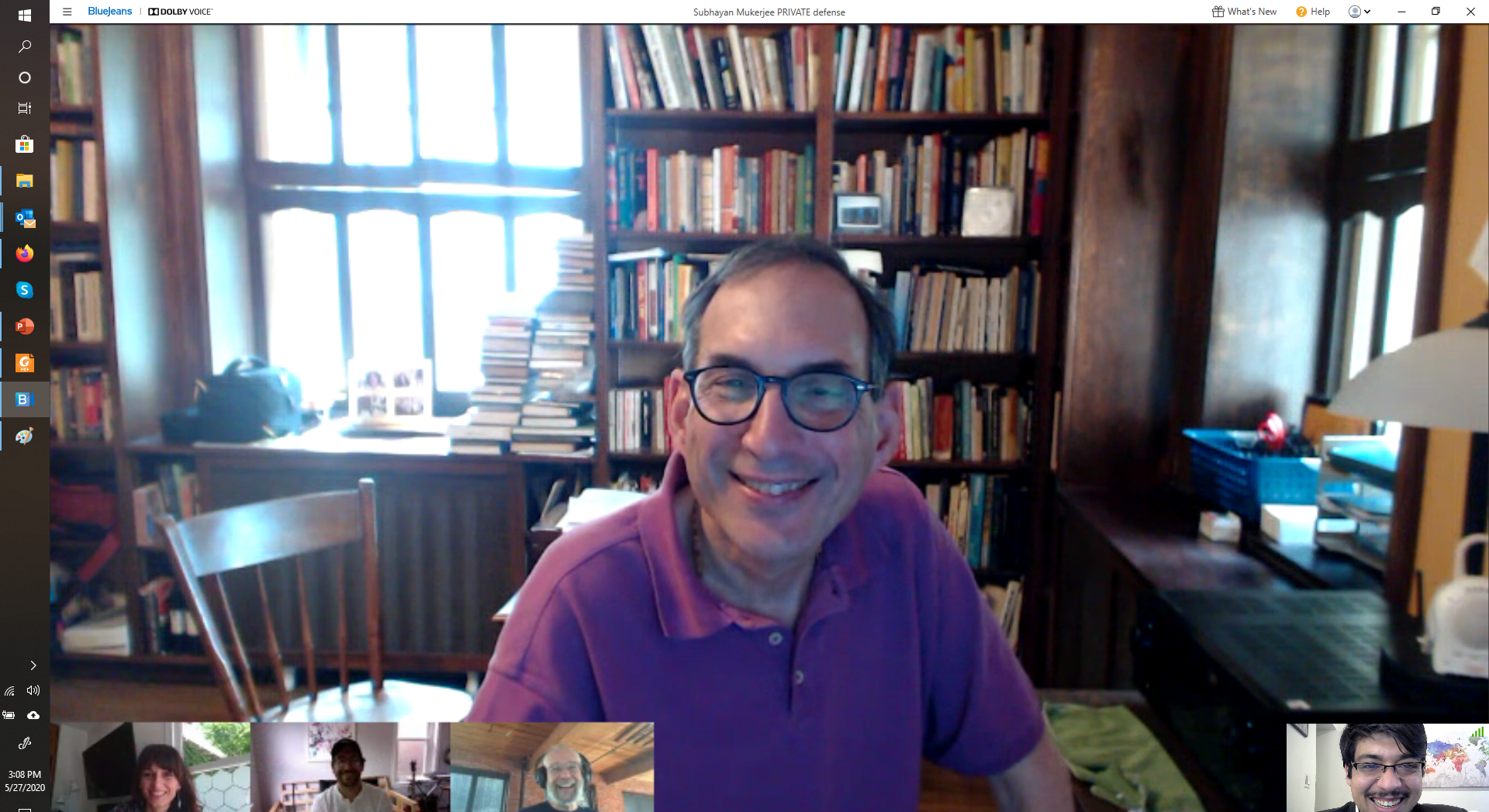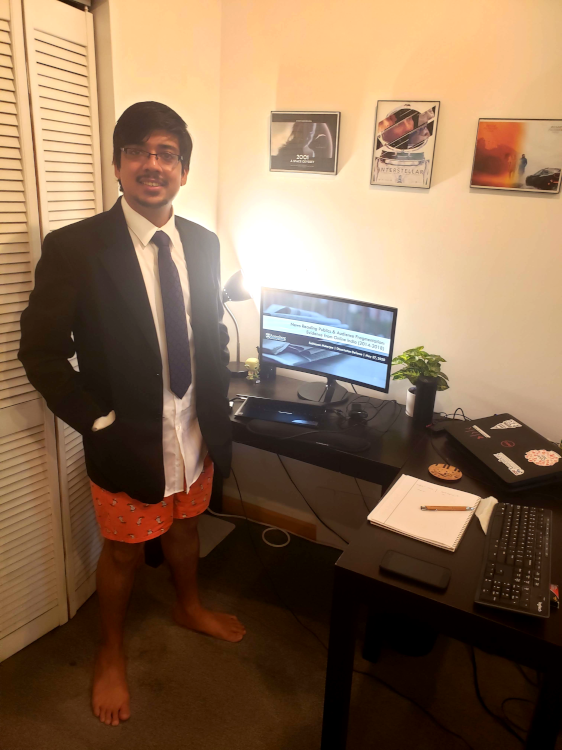PhD Acknowledgments
Published:
I defended my PhD dissertation today! Because a PhD is so much more than an individual effort, this is what I wrote in the acknowledgements section of my dissertation:
–
Legend has it that when Sissa Ben Dahir invented the game of chaturanga (the precursor to what is today known as chess) in ancient India, the king was so impressed that he asked Sissa to name any reward for his invention. Sissa requested the following: “Just one grain of wheat on the first square of the board. Then put two on the second square, four on the next, then eight, and continue, doubling the number of grains on each successive square, until every square is reached.” The king, though bemused at the oddity of this request, immediately ordered his courtiers to ensure that the required number of grains be given to Sissa. It was only a little later that the king was informed that the task was impossible. In fact, as his court mathematicians told him, there wasn’t enough land area in the whole of the world to grow the amount of wheat - 18,446,744,073,709,551,615 grains - that Sissa had requested.
This legend, while illustrating how bad people generally are at understanding exponential growth, is of particular relevance to the task I have at hand - that of writing the acknowledgements section of my dissertation. I am the ancient Indian king Shirham, blissfully unaware of his own naiveté, all the while expecting a problem to be tractable, when it actually isn’t. In other words, acknowledging everyone who made this dissertation possible is a futile exercise. I recognize the hidden, often random ways in which people succeed, and if my getting a Ph.D. is any measure of personal success, I owe it to the immeasurable number of people who have touched my life for the better, and who deserve my deepest gratitude for where I am today. I am indeed sorry that I cannot name every single one of you individually.
Turning the clock back to the fall of 2014: I was a confused bloke in my mid 20s, having a very vague aim in life to do research in some capacity - preferably in a Ph.D. program. But I didn’t know where to start. Sure, I had taken my GRE and TOEFL exams. But what next? What did I even want to study? Thus, when I sent out a hundred emails to a number of professors craving for a slice of their attention, little did I expect anything to really materialize. So I was pleasantly surprised, not to mention, relieved, when I heard back from a certain Prof. Sandra González-Bailón, who urged me to apply to the Ph.D. program at the Annenberg School at Penn. A year later, I would be in said Ph.D. program, fumbling around trying to make sense of this alien thing called “Communication”, and Prof. Sandra González-Bailón would be my advisor.
To put it bluntly: this Ph.D. would not have happened without her. She was instrumental in my transition to the social sciences, and helped me in countless ways in coming to terms with this bewildering new discipline that I found myself thrust into. Sandra has been the most amazing mentor I could have hoped for, and I feel thankful to have had her support along what would otherwise have been a far more arduous journey. She introduced me to the fascinating world of networks and helped chart my path forward as a computational social scientist over the course of my Ph.D. She has truly shown what it means to offer constructive feedback - and I am a better academic today because of her. I hope to be able to pass on what I have learnt from her to my future students, as I look forward to starting my career in academia.
Next, I am very lucky to have had three peerless academics on my dissertation committee, who have been incredibly supportive of my doctoral research.
I thank Prof. Yphtach Lelkes for being a limitless repository of academic knowledge, and for always having the right answer to any research-related question that one can think of. Getting to know him has been like turning on a faucet of research advice, and I regret not meeting him earlier. Literature reviews are definitely easier when you have Yph on your side, and I am glad to be collaborating with him on multiple research projects today.
I thank Prof. Joe Turow for being so illuminating in every conversation I have had with him - be it in his office, in his house when he had us all over for lunch, or while waiting for a flight at Prague airport. I have learnt so much from him, and I can only aspire to achieve the level of authority in my field that he has achieved in his. I would also like to thank him for offering a rare course on the history of media research during my time at Annenberg, a course that has been most helpful for me at a personal level.
I thank Prof. Michael X. Delli Carpini for always taking time out of his extraordinarily busy schedule as the former Dean - to respond to every email no matter how trite, to have in-person meetings, and even go out for lunch. He has been a model to emulate when it comes to balancing a high level of intellect with administrative acumen and personal affability. I feel truly thankful for getting to know him over the past several years.
Next, I would also like to thank Prof. Robert Hornik, Prof. Joe Cappella, Prof. Paul Rosenbaum, and Prof. Marwan Kraidy for being significant sources of inspiration, instruction, and help along my way. Many of the things I learned in their classes have found direct application in my doctoral research, and for that, I am thankful. On that note, I am also grateful to Prof. Hari Nair from my alma mater, BITS Pilani, for his guidance during my graduate school application process, and for helping me embark on my Ph.D. journey. Thanks are due to Prof. Ananda Mitra as well, for his helpful feedback on my dissertation.
It would be remiss to not acknowledge the entire staff at the Annenberg school for being the silent heroes behind every dissertation that this school produces. In particular, I owe a huge debt of gratitude to Joanne Murray for being who she is. The more I hear about the logistical and administrative travails of international graduate students in other programs and universities, the more I feel grateful to Joanne for being there to iron out all glitches that I have faced. A special token of appreciation is also due for the IT and library staff, particularly Elizabeth Cooper, and Sharon Black, for always being there when I have needed them.
The Annenberg journey would not have been half as enjoyable but for the friends I made along the way. These include those in my cohort - specially Helene Langlamet, Rui Pei, Leah Ferentinos, and Stefanie Gratale - I will forever cherish all our lunches and daily arguments over choice of food cart; those in my research group - particularly Tian Yang, Alvin Zhou, Dr. Sílvia Majó-Vázquez in Oxford, and Prof. Kokil Jaidka in Singapore - for being wonderful folks to work and have fun with at the same time (shout out to Alvin for all the times he has driven me to and from the airport!). Also, a special mention to Prateekshit Pandey, Soojong Kim, Josh Becker, Dror Walter, Sijia Yang, and Yotam Ophir: I have thoroughly enjoyed the numerous stimulating conversations I have had with them, and I look forward to staying in touch with them in the future.
Finally, no words can do justice to the debt I owe my family. My parents have been the two constants in my life who have always ensured that the environment I grew up in privileged intellectual over material pursuits. Ma has been my rock: she has provided the moral foundation upon which I have grown; and Baba has always encouraged me to “break out of my comfort zone”. One of his pithy sayings, “resources are limited, creativity is unlimited” is something that I always take to heart when faced with uncertainty and difficulty. They were instrumental in kindling the spark of scientific curiosity in me from a very young age, and my academic trajectory would not have been possible without their inspiration and guidance. They have made numerous sacrifices along the way, many of which I am probably not even aware of, so that I can be where I am today. To them I say: thank you, for everything. I am proud to be your son, and I hope I make you proud some day.
Growing up in a joint family in 90s India, I am also grateful to my grandparents who contributed greatly in making me who I am. Dadai, Dida, and Thamma: my love and pronaam for you, always. Dadu (who I wish I knew better, than through stories told by Baba and Thamma, and one faded photograph from 1993 where I am perched atop his lap), this wouldn’t have been possible without your blessings.
Last but definitely not the least, I had the unexpected fortune of marrying the most amazing woman I know, during my Ph.D. Nilanjana has been my confidant, my best friend, and the most wonderful co-dissertator that I could have ever hoped for. We have shared many memorable moments as we have struggled with our respective coursework and research, and I shudder to think what the past few years would have been like without her companionship - certainly far more miserable and far less gastronomically satisfying. She has made me a better person, a better researcher, and an undeniably better cook (though we tend to disagree on that). Both of our families have been very supportive of our relationship and of our academic journeys, and for that I am very thankful. I am particularly grateful to Dada and Boudi for all the help and support they have provided me throughout my Ph.D. and job hunt - from solutions to everyday problems to proof-reading my dissertation, from career advice to refreshing conversations about science and philosophy. And not to mention, some of the tastiest home-made food that a jamai could hope to have in the US. More importantly, they gave me something that I did not have here in this country - a place to call home.
I will wrap up with a final tip of the hat to the many unnamed people, who have directly assisted me in my research - from individuals such as user har07 on Stack Overflow to the heroes of the open-source community that have made wondrous things like R, Python, Zotero, Firefox, Git, Wikipedia, and Linux possible. The modern world can be a frightening place, but it trudges along because of you. Thank you.
–
Official screenshot following my passing my defense:

I also love my defense attire, as you can see here.

–
The slide deck of my defense presentation can be found here.
